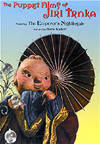The Puppet Films of Jiri Trnka
"The Emperor’s Nightingale" is a delightful, 70-minute visualization of the Hans Christian Andersen fairy tale about the Emperor of China, a lonely boy who is eventually liberated from his caged life of rules and rituals by the beautiful song of a nightingale. Trnka wraps the fairy tale story around the live action tribulations of a boy also born of privilege, but similarly choked by too many "don’ts." Struck with fever, the real boy imagines that his toys awaken and act out the parallel story of the Emperor. As the tale unfolds (narrated by Boris Karloff, which already kicks it up a notch), both come to understand the value of freedom and individuality. Trnka’s gift here is in mixing the mundane with the poetic.
The subsequent five short films range from a meditation on the pomposity of polite society to a cautionary tale about drinking and driving to a tragic parable about the human spirit’s ever-continuing battle to break the shackles of conformity. In "Story of the Bass Cello," we witness a cellist enjoying a simple swim in a country lake, only to find love…and a very compromising predicament. "The Song of the Prairie" simultaneously praises and skewers the American Western, down to the well-dressed singing cowboy, the stagecoach ride threatened by highway bandits and the villain absconding the heroine with the hero (who always has a moment to comb his hair) in hot pursuit. "The Merry Circus" eschews Trnka’s trademark puppet animation, breathing life into paper cutouts of dancing bears and juggling seals, foreshadowing (perhaps inspiring?) Terry Gilliam’s two-dimensional animations for the Monty Python troupe.
"A Drop Too Much" dourly dramatizes what happens when a man forgets that the message of responsible drinking when driving is not just a slogan. Finally, with "The Hand," Trnka’s last film makes perhaps his greatest statement about the human condition, as an artist fights a giant hand for the freedom to express himself by sculpting a pot, rather than a tribute in the form of another hand.
A 12-minute narrated documentary, "Jiri Trnka: Puppet Animation Master," rounds out the DVD program. Featuring rare backstage footage of Trnka sketching, assembling his creations and breathing life into his "actors," the documentary adroitly encompasses Trnka’s achievements, artistry and his place in the world of fantastic cinema. A moustachioed gentle giant, Trnka placed his puppet creations within milieus that both comforted and challenged.
Lastly, a plea to other DVD content providers: "Puppet Films" represents an important call in bringing some of the lesser-known movie magicians to DVD. The works of Gilliam are readily available and the efforts of Pal and Bava are finding increased representation in the format. Yet, the extraordinary vistas of Karel Zeman, encompassing "The Adventures of Baron Munchausen" as well as "The Fabulous World of Jules Verne," and Alexander Ptushko’s epic fairy-and folk-tale films, are appallingly absent. One hopes that with the release of "Puppet Films", the first step has been taken in bringing the fanciful dreams of such cinematic visionaries out of the darkness of obscurity.







